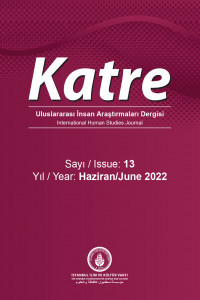Kur’ân’ın Farklı Bir İ’caz Vechi: Ayet Sonlarındaki Fezlekelerin Esmâ-i Hüsnâ’yı İşaret Etmesi
ÖzBediüzzaman Said Nursi, Mucizât-ı Kur’âniye Risalesi adını verdiği 25. Söz’deKur’an’ın kırk vecihle mucize olduğunu söylemiş ve bu vecihleri çeşitli örneklerle izahetmiştir. Kırk vecihten onu, ayet sonlarındaki “fezleke”lerin Esmâ-i Hüsnâ’yı işaret etmesiyleilgilidir. Fiilin geniş olarak anlatılıp ilgili ilahî ismin bu fiilden çıkarılması, sanattanSânia gidiş, önce Allah’a ait fiillerin geniş şekilde anlatılması sonra özetlenerek ilahî isimlerleilişkilendirilmesi, nizamdan Esmâ-i Hüsnâ’ya gidiş, tegayyürden sabit hakikatlerinkaynağı olan esmâya geçiş, kesretten vahdete geçiş, zâhirî sebepten müsebbib-i hakîki’yegidiş, dünyevî fiillerden âhiretteki fiillere geçiş, cüz’î maksattan küllî maksada gidiş vekulun isyanını gösterip rahmete işaret eden ilâhî isimlere yönlendirme yapılması gibi yollarlaBediüzzaman ayet sonlarındaki fezlekelerde Allah’ın çeşitli isimlerine gidilebileceğiniispat etmiştir.Bediüzzaman her şeyde Esmâ-i Hüsnâ’ya bir yol bulmaya çalıştığı gibi Kur’an’ın i’cazıkonusunda da böyle bir yol bulmaya çalışmış ve bunu Kur’an’ın i’caz vecihlerinden biriolarak göstermiştir.AbstractSaid Nursi stated in his treatise titled “The Miracles of The Qur’an” (The 25th Word)that there are forty miraculous aspects of the Qur’an and these aspects have been explainedwith various examples. One aspect is concerned with the indication of the summariesof the Beautiful Names at the end of each verse. Nursi explains, in an extensive fashion,the way various divine actions have been removed from the context of being divine names,proceeding from being genuine art to that of fraud and trickery. Nursi first proceeds byexplaining the actions pertaining to God in a broad fashion and then summarises them intheir form of association with divine names. Proceeding from the Beautiful Names, Nursidescribes the names that are the source of firm and established truth and reality. He thendiscusses the abundance of unity, the means and origin of apparent and external causes,worldly actions and deeds and those of the Hereafter and the difference between particularand universal aims. Finally, Nursi has proved the various ways of reaching and apprehendingGod’s various names in the summaries at the end of various Qur’anic verses. Just asBediuzzaman Said Nursi has worked to bring the Beautiful Names of God (and make themrelevant) to all things; he has also brought this via the subject of the Qur'an's Miracleswhich Nursi has shown to comprise one great miracle.
A Different Miraculous Aspect of the Qur'an: the Indication of the Summaries of the Names of Beauty at the End of Each Verse
AbstractSaid Nursi stated in his treatise titled “The Miracles of The Qur’an” (The 25th Word)that there are forty miraculous aspects of the Qur’an and these aspects have been explainedwith various examples. One aspect is concerned with the indication of the summariesof the Beautiful Names at the end of each verse. Nursi explains, in an extensive fashion,the way various divine actions have been removed from the context of being divine names,proceeding from being genuine art to that of fraud and trickery. Nursi first proceeds byexplaining the actions pertaining to God in a broad fashion and then summarises them intheir form of association with divine names. Proceeding from the Beautiful Names, Nursidescribes the names that are the source of firm and established truth and reality. He thendiscusses the abundance of unity, the means and origin of apparent and external causes,worldly actions and deeds and those of the Hereafter and the difference between particularand universal aims. Finally, Nursi has proved the various ways of reaching and apprehendingGod’s various names in the summaries at the end of various Qur’anic verses. Just asBediuzzaman Said Nursi has worked to bring the Beautiful Names of God (and make themrelevant) to all things; he has also brought this via the subject of the Qur'an's Miracleswhich Nursi has shown to comprise one great miracle.
___
- Bediüzzaman Said Nursî, Sözler, Sözler Neşriyat, İstanbul, Ocak 2012, s. 407
